Kevin DeYoung's Blog, page 178
May 14, 2011
Good Enough
Here's an interesting paragraph from David Brooks' new book The Social Animal. From a secular perspective it overlaps with some of the points I raised in Tuesday's parenting post.
If there is one thing developmental psychologists have learned over the years, it is that parents don't have to be brilliant psychologists to succeed. They don't have to be supremely gifted teachers. Most of the stuff parents do with flashcards and special drills and tutorials to hone their kids into perfect achievement machines don't have any effect at all. Instead, parents just have to be good enough. They have to provide their kids with stable and predictable rhythms. They need to be able to fall in tune with their kids' needs, combining warmth and discipline. They need to establish the secure emotional bonds that kids can fall back upon in the face of stress. They need to be there to provide living examples of how to cope with the problems of the world so that their children can develop unconscious models in their heads. (60-61)
HT: Collin Hansen
May 13, 2011
Paul's Understanding of the Church's Mission
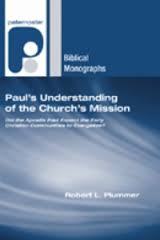 If there is one thing we all know that God expects of us as Christians, it's that we ought to share the gospel with those who don't know Christ. Evangelical Christians are evangelistic. It's maybe the only thing self-proclaimed evangelicals agree on: God wants us to tell others about Jesus.
If there is one thing we all know that God expects of us as Christians, it's that we ought to share the gospel with those who don't know Christ. Evangelical Christians are evangelistic. It's maybe the only thing self-proclaimed evangelicals agree on: God wants us to tell others about Jesus.
Yet think for a moment. Can you give me a text that commands Christians to evangelize the lost? Okay, you got Matthew 28:18-20, but keep your Bible closed and see if you can come up with another. The promise to Abraham to bless the whole world through him doesn't count. Neither do the worship scenes in Revelation 5 and 7. I want verses that do more than show God's heart for the nations or his promise to make the nations glad in God. I want texts which show that God's people should be pursuing the nations with the good news of the gospel.
Keep thinking.
Keep thinking.
It's not as easy as it sounds to come up with texts on evangelism. I should clarify. It's very easy to come up with texts that show Paul (or one of the apostles) as an evangelist, but not as simple to demonstrate that Paul expected the early Christian communities to evangelize. That's why Plummer's book Paul's Understanding of the Church's Mission is such an important book.
THE BIG IDEA
Paul's Understanding is Robert Plummer's revised Ph.D. dissertation. It is a dense, much footnoted book, just what you would expect from the dissertation of an assistant professor of New Testament interpretation at The Southern Baptist Theological Seminary. Thankfully, the book's thesis is stated clearly.
In the end, this book seeks to show that Paul envisioned himself as an apostle who conveyed the dynamic gospel to his hearers, so that the same effective, self-diffusing word that characterized Paul's apostolic mission also characterized the congregations he began. As extensions of the apostles' ministry, the churches are agents of God's word, which continues to work in and spread through them (e.g., Col. 1:5-6; 3:16-17; 1 Thess. 1:8; 2:13-16; 2 Thess. 3:1). By its very nature, the "apostolic church" must be missionary. (2)
In short, Paul evangelized and expected the churches he planted to do the same.
AN OVERVIEW
In Chapter 1 Plummer surveys the scholarly field, placing various authors into one of four categories: 1) pre-1950 continuity, 2) pre-1950 discontinuity, 3) 1950-present discontinuity, 4) 1950-present continuity. Continuity in this scheme means the scholars argue or assume that Paul expected his churches to evangelize; discontinuity means that the apostle did not expect the early Christian communities to evangelize as he did.
In the earlier period of continuity we find scholars like Roland Allen and Adolf von Harnack. Pre-1950 discontinuity scholars include Ernest Renan and William Wrede.
W.P. Bowers, David Bosch, and John Dickson (an Australian apologist who has written a number of popular, lay-level books on mission related themes) are among the later scholars who argue that Paul did not expect local congregations to evangelize.
In the last category (more recent arguments for continuity), Plummer examines several familiar names, including Peter T. O'Brien, I. Howard Marshall, Eckhard J. Schnabel, and G.K. Beale.
Plummer's conclusion from the scholarly field is that there is no consensus, so we must give careful attention to the biblical text.
In Chapter 2 Plummer argues that Paul's gospel was a "dynamic entity that propelled him (as an apostle) and the churches (as gospel-created and gospel-empowered entities) into the further spread of God's word" (67). In other words, it is the nature of the gospel as a powerful force to go forth in mission. Plummer sees evidence of this dynamic gospel in texts like 1 Corinthians 14:36, 1 Thessalonians 1:5, 2 Timothy 2:8-9, and Colossians 1:5-7.
More to the point, Plummer shows how the word of God, once received, then advances through those who received it. This was especially evident in the Thessalonian church where the word was at work in the believers (1 Thess. 2:13-16), the word was running ahead (2 Thess. 3:1), and the word was ringing and sounding forth (1 Thess. 1:8). Plummer makes a convincing case that this language indicates evangelistic activity.
Chapter 3 is the most helpful section. Here Plummer examines specific, largely overlooked texts in which Paul tells his churches to proclaim the gospel.
Philippians 1:12-18 suggests that Paul anticipated Christ being "proclaimed in every way" by the church in Philippi.
The shoes (part of the armor of God) in Ephesians 6:15 should make the believers "ready to proclaim the gospel of peace" (NRSV).
1 Corinthians 4:16 exhorts the early church to imitate Paul's openness to suffer as a result of proclaiming the foolishness of the cross.
Similarly, 1 Corinthians 11:1 calls Christians to imitate the Apostle in his salvific concern for outsiders.
We also see evidence that the Corinthians were to be concerned for the salvation of nonbelievers in 1 Corinthians 7:12-16 and 14:23-25.
Besides these examples of "actively" sharing the gospel, several texts show how the early churches were to "passively" bear witness to Christ. Texts such as 2 Corinthians 6:3-7, 1 Thessalonians 2:5-12, and Titus 2:1-10 demonstrate that "all the various segments of the Christian community are to live praiseworthy lives—not simply for the sake of obeying God, but also because their behavior will commend or detract from the gospel" (104-5).
In Chapter 4 Plummer offers incidental evidence to support the claims made in Chapters 2 and 3. He points to three other facets of the apostolic mission that were to be replicated in the life of the church.
1) Miracles. Signs and wonders would serve a dual purpose of strengthening Christians and attracting the notice of outsiders.
2) Prayer. Paul prayed for non-believers (Rom. 10:1), gave thanks for churches' missionary activity (Phil. 1:3-5; 1 Thess. 1:2-8), and prayed about his congregations' relationship with outsiders (1 Thess. 3:12). These sorts of prayers were to continue in the churches themselves.
3) Teaching and building. Paul's expansive missionary vision did not end with frontier evangelism but spilled over in the edifying of the churches he planted. This is another example of apostolic mission that was expected to be replicated in the early church.
Finally, Plummer wraps things up with conclusions and implications in Chapter 5. After a summary of the ground already covered, Plummer offers this final advice to today's church:
Just like the ancient churches that Paul addressed, modern churches should be active in proclaiming the gospel, suffering for the gospel, authenticating the gospel by their behavior, confirming the gospel through miracles, building-up the church, and praying for missions and the church. (144)
Amen and amen.
EVALUATING THE BOOK
The book's strengths are already hinted at in the chapter synopses. Plummer is organized in his structure and meticulous in his research. Most crucially, by examining dozens of texts, he makes a convincing case that Paul did in fact expect the early Christian communities to evangelize. This may seem obvious to most evangelicals, but it is important we see this conclusion backed by solid scholarship.
My criticisms of the book are entirely unfair, in that they all fall under the category "dissertations make bad books." Actually, I shouldn't say bad, just inaccessible. The final implication section was too short and many sentences were too long. Pages comprised almost entirely of footnotes can be daunting for even the hearty pastor, as can untranslated German. And I confess a general annoyance with the academic convention of constantly saying "we will do this, then we will do that…we did this and we did that." Worst of all, the Paternoster cover just screams "I'm for super smart people who eschew good taste! Don't pick me up unless you have a Ph.D.!" Designing a cover with blah shades of windswept blue may be all the rage in academia, but it's a particularly effective way to keep away normal readers.
But, as I said, those criticisms are asking the book to be something it's not. I only bother to mention the complaints because I like the content so much. I hope Dr. Plummer will consider publishing a popular level edition of the material which puts the cookies a few shelves lower and hires a graphic design team not so tied to the 1970s. Robert Plummer is to be commended for an excellent and timely work. I hope his insights are made available to the church far and wide.
This review originally appeared in the May-June 2011 issue of the 9Marks eJournal.
May 12, 2011
On Being Better Bereans
 A couple weeks ago, Trevin Wax posted a short list of urban legends frequently heard from the pulpit. These aren't doctrinal mistakes per se. They are mistakes in interpretation, especially when it comes to appropriate background information and extra-biblical sources. Some of the myths are real whoppers (e.g., NASA has discovered a missing day), but others are repeated in study Bibles and commentaries (e.g., Gehenna was a burning trash dump). I admit I've repeated the last example many times. And while Trevin didn't give a lot of information to counter that claim, the article he linked to makes a lot of sense. Maybe the "trash heap" illustration was too good to be true.
A couple weeks ago, Trevin Wax posted a short list of urban legends frequently heard from the pulpit. These aren't doctrinal mistakes per se. They are mistakes in interpretation, especially when it comes to appropriate background information and extra-biblical sources. Some of the myths are real whoppers (e.g., NASA has discovered a missing day), but others are repeated in study Bibles and commentaries (e.g., Gehenna was a burning trash dump). I admit I've repeated the last example many times. And while Trevin didn't give a lot of information to counter that claim, the article he linked to makes a lot of sense. Maybe the "trash heap" illustration was too good to be true.
So how can we be better Bereans? Most Christians are eager to receive the word, especially when we get new insights and background information, but how many go the extra step and examine the Scripture to see if the new nugget is actually true (Acts 17:11)? Here are a few things to keep in mind when we hear an exciting new teaching or connection:
1. Be wary of anyone who claims to have uncovered the real meaning from the Greek or Hebrew. We have so many good English translations, put together by the best scholars. If your pastor or favorite author comes up with stuff they never did, be concerned.
2. Ask yourself, "how do I know this is so?" True, we all take a lot on faith, trusting the books we read and the people we listen to. But if you come across a new insight you've never heard, examine what primary source evidence there is for this new claim. You may think the Bible says a lot about Lucifer, but it may be really be from John Milton.
3. Beware of parallelomania! This is where a lot of Christians get into trouble. They are over-eager to make connections between the Bible and the Roman world. Yes, background information is helpful. But some popular teachers find connections everywhere. Do we really know that Jesus' question "Who do you say that I am?" was meant to be an assault on the worship of Pan near Caesarea Philippi? Often a possible connection is too good to pass up as preaching fodder. The results are predictable: the teacher presents amazing new background information and the people are amazed at the insights they've never heard before. Preachers, resist the temptation to put preaching points before exegesis and historical accuracy.
4. Be careful not to overcompensate. With all the good historical work N.T. Wright has done on the gospels, I often feel he is too quick to find political implications in familiar stories and too quick to make the narrative fit a return-from-exile theme. Many Christians have the habit of reading the Bible as a timeless book of ancient wisdom. That's not right, but there's an opposite danger, and that's trying to make every story a subversive attempt to undermine Caesar.
5. Be concerned when you start to feel like you can't possibly understand the Bible without multiple degrees. It does take skill to interpret many parts of the Bible, and background information can help. But if all the exciting things you're learning fall in the category of "insights from ancient languages" or "insights from ancient culture" you could be heading down the wrong path.
6. Be extremely cautious when using Jewish sources. Christians love to hear about Jewish background. They love to learn what words or phrases really mean. But we must be careful. I use Jewish background on occasion. Just this week I preached on the Last Supper and talked about the Passover ritual. But I'm always cautious to do so. Consider:
a) Most of our "Jewish background" comes from the Mishna and Talmud which are centuries after the New Testament. Some of what they record was present in the first century, but it's hard to be certain.
b) Whether we are using sources from Second Temple Judaism or from the Mishna, we shouldn't be confident in our ability to recreate the Jewish world. That world was diverse and there is a lot we don't know.
c) Don't assume Jewish practices today reflect Jesus' world. And don't read back into the Old Testament what we first hear about centuries after Christ.
7. Realize that we all make mistakes. We hear things and read things that we later find out aren't true. Be open to correction and ready to admit when you make a mistake. The goal is simply to know the Bible better. What have Bereans got to lose?
May 11, 2011
RCA Integrity Conference, May 16-17
There is still time to sign up for the RCA Integrity Leadership Conference. A small group of RCA pastors, spouses, and lay leaders will be gathering at Trinity Evangelical Divinity School on May 16-17.
Some of our discussions may be RCA-centric, but everyone is welcome to attend.
Speakers include: Ligon Duncan from the PCA and two RCA pastors, Adam Barr and Bob Bouwer. I'll be doing a session too.
You can register and learn more about the conference here.
Families Past and Present
In addition to reading good new books on parenting, it can be worthwhile to read history too. To that end, some may be interested in reading a short book by Steven Ozment, Ancestors: The Loving Family in Old Europe. It's always interesting to see what was very different: the harsh corporal punishment, the seen-and-not-heard approach to child-rearing, the penchant in some societies for sending kids off to another city at an early age.
But it's also fascinating to see what hasn't changed. For example, Ozment includes several letters of parental advice from Old Europe that sound remarkablycontemporary. He also lists popular group games from the 16th century, familiar fare like ball, ring-around-the-roses, hide-and-go-seek, chase, thieves and sheriffs, musical chairs, and freeze. Ozment also debunks several myths about the families of yesteryear, myths like: women were perpetually unhappy with their lot in life, children were unloved, no one tried birth control, and teenagers didn't rebel.
The book is only 112 pages of text. Although a scholarly work, it is easy to read and full of good anecdotes. Here is the conclusion:
For a modern age faced with a family crisis, there is good news from the recovered history of the family: this smallest and seemingly most fragile of institutions is proving itself to be humankind's bedrock as well as its fault line. Its strength lies in the cohesion and loyalty of the parent-child unit around which the larger worlds of household and kin, community and nation, and the global village necessarily revolve. Among these various social worlds, only the family creates itself virtually from nothing and gives life and stability to others. The family is the great survivor amid the changing ages and cultures that envelop, shape, and test it for a while, only to run their course and pass away. (111-12)
May 10, 2011
Parenting 001
Does it seem like parenting has gotten more complicated? I mean, as far as I can tell, back in the day parents basically tried to feed their kids, clothe them, and keep them away from explosives. Now our kids have to sleep on their backs (no wait, their tummies; no never mind, their backs), while listening to Baby Mozart surrounded by scenes of Starry, Starry Night. They have to be in piano lessons before they are five and can't leave the car seat until their about five foot six.
It's all so involved. There are so many rules and expectations. Kids can't even eat sugar anymore. My parents were a solid as rock but we still had a cupboard populated with cereal royalty like Captain Crunch and Count Chocula. In our house the pebbles were fruity and the charms were lucky. The breakfast bowl was a place for marshmallows, not dried camping fruit. Our milk was 2%. And sometimes, if we needed to take the edge off a rough morning, we'd tempt fate and chug a little Vitamin D.
Trial by Error
I don't consider myself a particularly good parent. I was asked to speak a few years ago at some church's conference. They wanted me to talk about parenting. I said I didn't have much to say so they should ask someone else (which they did). My kids are probably not as crazy as they seem to me (at least that's what I keep telling myself anyway), but if I ever write a book on parenting I'm going to call it The Inmates Are Running the Asylum.
There are already scores of books on parenting, many of them quite good. I've read several of them and have learned much. I really do believe in gospel-powered parenting and shepherding my child's heart. I want conversations like this:
Me: What's the matter son?
Child: I want that toy and he won't give it to me!
Me: Why do you want the toy?
Child: Because it will be fun to play with.
Me: Do you think he is having fun playing with the toy right now?
Child: Yes.
Me: Would it make him sad to take the toy away?
Child: I guess so.
Me: And do you like to make your brother sad?
Child: No.
Me: You know, Jesus tells us to love our neighbor as ourselves. That means loving your brother the way he would want to be loved. Since Jesus loves us so much, we have every reason to love others–even your brother. Would you like to love him by letting him play with the toy for awhile?
Child: Yes I would daddy.
I try that. Really I do. But here's what actually happens:
Me: What's the matter son?
Child: I want that toy and he won't give it to me!
Me: Why do you want the toy?
Child: I don't know.
Me: What's going on in your heart when you desire that toy?
Child: I don't know.
Me: Think about it son. Use your brain. Don't you know something?
Child: I guess I just want the toy.
Me: Obviously. But why?
Child: I don't know.
Me: Fine. [Mental note: abandon "why" questions and skip straight to leading questions.] Do you think he is having fun playing with the toy right now?
Child: No.
Me: Really?! He's not having fun? Then why does he want that toy in the first place?
Child: Because he's mean.
Me: Have you ever considered that maybe you are being mean by trying to rip the toy from his quivering little hands?
Child: I don't know.
Me: What do you know?
Child: I don't know!
Me: Nevermind. [I wonder how my brilliant child can know absolutely nothing at this moment.] Well, I think taking the toy from him will make your brother sad. Do you like to make him sad?
Child: I don't know.
Me: [Audible sigh.]
Child: He makes me sad all the time!
Me: Well, I'm getting sad right now with your attitude! [Pause, think, what would Paul Tripp do? Thinking . . . .thinking . . . .man, I can't stop thinking of that mustache. This isn't working. Let's just go right to the Jesus part.] You know, Jesus wants us to love each other.
Child: I don't know.
Me: I didn't ask you a question!
Child: [Pause.] Can I have some fruit snacks?
Me: No, you can't have fruit snacks. We are talking about the gospel. Jesus loves us and died for us. He wants you to love your brother too.
Child: So?
Me: So give him the toy back!
Then I lunge for the toy and the child runs away. I tell him to come back here this instant and threaten to throw the toy in the trash. I recommit myself to turning down speaking engagements on parenting.
Growing What You Can
I want to grow as a parent–in patience and wisdom and consistency. But I also know that I can't change my kids' hearts. I am responsible for my heart and must be responsible to teach them the way of the Lord. But nothin' guarantees nothin'. I'm just trying to be faithful, and then repent for all the times I'm not.
I have four kids and besides the Lord's grace, I'm banking on the fact that there really are just a few non-negotiables in parenting. There are plenty of ways to screw up our kids, but whether they color during church, for example, is not one of them. There is not a straight line from doodling in the service as a toddler to doing meth as a teenager. Could it be that beyond the basics of godly parenting, that most of the other techniques and convictions are nibbling around the edges? Certainly, there are lots of ways that good parents make parenting a saner, more enjoyable experience, but even the kid addicted to Angry Birds who just downed a pack of Fun Dip and is now watching his third Pixar movie of the week (day?) still has a decent shot at not being a sociopath.
I remember years ago hearing a line from Alistair Begg, quoting another man, that went like this: "When I was young I had six theories and no kids. Now I have six kids and no theories." I must be smart. It only took me four kids to run out of theories.
Getting a Few Things Right
I look back at my childhood and think, "What did my parents do right?" I watched too many Growing Pains reruns and played a lot of Super Techmo Bowl (LT could block every extra point and Christian Okoye was a stud). I never learned to like granola or my vegetables (kids, stop reading this post immediately!). But yet, I always knew they loved me. They made me go to church every Wednesday and twice on every Sunday. They made us do our homework. They laid down obvious rules–the kinds that keep kids from killing each other. They wouldn't accept any bad language, and I didn't hear any from them. Mom took care of us when we were sick. Dad told us he loved us. I never found porn around the house or booze or dirty secrets. We read the Bible. We got in trouble when we broke the rules. I don't remember a lot of powerful heart-to-heart conversations. But we knew who we were, where we stood, and what to expect. I'd be thrilled to give my kids the same.
I worry that many young parents are a) too adamant about the particulars of their parenting or b) too sure that every decision will set their kids on an unalterable trajectory to heaven or hell. It's like my secretary at the church once told me: "Most moms and dads think they are either the best or the worst parents around, and both are wrong." Could it be we've made parenting too complicated? Isn't the most important thing not what we do but who we are as parents? They will see our character before they remember our exact rules regarding television and twinkies.
I could be wrong. My kids are still young. Maybe this no-theory is a theory of its own. I just know that the longer I parent the more I want to focus on doing a few things really well, and not get too passionate about all the rest. I want to spend time with my kids, teach them the Bible, take them to church, laugh with them, cry with them, discipline them when they disobey, say sorry when I mess up, and pray like crazy. I want them to look back and think, "I'm not sure what my parents were doing or if they even knew what they're were doing. But I always knew my parents loved me and I knew they loved Jesus." Maybe it's not that complicated after all.
May 9, 2011
Monday Morning Humor
May 7, 2011
Books I Haven't Read
Now that I've been blogging for awhile I get a lot of books sent to me. Many of them are by people I know. Most of them look good. We really have an embarrassment of riches in this country when it comes to good Christian resources.
But alas I can't read most of them. Here are some of the books I've gotten in the last few months that I'd like to read if I had more time.
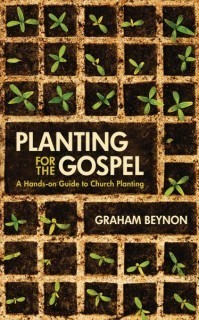 Graham Beynon. Planting for the Gospel: A Hands-on Guide to Church Planting (Christian Focus, 2011).
Graham Beynon. Planting for the Gospel: A Hands-on Guide to Church Planting (Christian Focus, 2011).
Short, British context, case studies. David Helm. One-To-One Bible Reading: A Simple Guide for Every Christian (Mattias Media, 2011).
David Helm. One-To-One Bible Reading: A Simple Guide for Every Christian (Mattias Media, 2011).
Really practical book on how to read the Bible with someone else.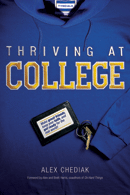 Alex Chediak. Thriving at College (Tyndale, 2011).
Alex Chediak. Thriving at College (Tyndale, 2011).
Could make a good graduation gift.
[image error]Trevin Wax. Counterfeit Gospels: Rediscovering the Good News in a World of False Hope (Moody, 2011).
Trevin is a clear writer. This book is a good diagnostic on false gospels in our world. David W. Jones, Russell S. Woodbridge. Health, Wealth & Happiness: Has the Prosperity Gospel Overshadowed the Gospel of Christ? (Kregel, 2011).
David W. Jones, Russell S. Woodbridge. Health, Wealth & Happiness: Has the Prosperity Gospel Overshadowed the Gospel of Christ? (Kregel, 2011).
Looks like a great resource for people swallowed up in this theology.
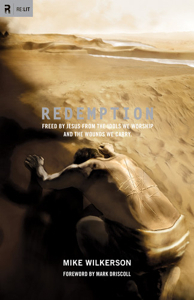 Mike Wilkerson. Redemption:Freed by Jesus from the Idols We Worship and the Wounds We Carry (Crossway, 2011).
Mike Wilkerson. Redemption:Freed by Jesus from the Idols We Worship and the Wounds We Carry (Crossway, 2011).
Paul Tripp calls it "a wonderful piece of gospel work." Justin S. Holcomb, Lindsey A. Holcomb. Rid of My Disgrace: Hope and Healing for Victims of Sexual Assault (Crossway, 2011).
Justin S. Holcomb, Lindsey A. Holcomb. Rid of My Disgrace: Hope and Healing for Victims of Sexual Assault (Crossway, 2011).
I'm sure I'll be recommending this to victims of sexual assault.
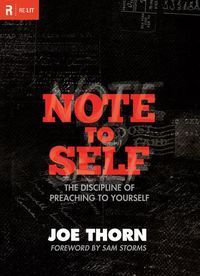 Joe Thorn. Note to Self : The Discipline of Preaching to Yourself (Crossway, 2011).
Joe Thorn. Note to Self : The Discipline of Preaching to Yourself (Crossway, 2011).
Short Practical chapters. Michael E. Wittmer. Christ Alone: An Evangelical Response to Rob Bell's Love Wins (Edenridge Press, 2011).
Michael E. Wittmer. Christ Alone: An Evangelical Response to Rob Bell's Love Wins (Edenridge Press, 2011).
Started reading this. Wittmer is a good thinker and is to be commended for issuing the first book length critique of Love Wins. Brian Croft, Phil A. Newton. Conduct Gospel-Centered Funerals: Applying the gospel at the unique challenges of death (DayOne Publications, 2011).
Brian Croft, Phil A. Newton. Conduct Gospel-Centered Funerals: Applying the gospel at the unique challenges of death (DayOne Publications, 2011).
Brian is a good mentor with practical ministry concerns like this.
[image error]Andreas J. Kostenberger, Robert W. Yarbrough. Understanding the Times: New Testament Studies in the 21st Century (Crossway, 2011).
Doug Moo's chapter on justification in Galatians is excellent. I look forward to reading more.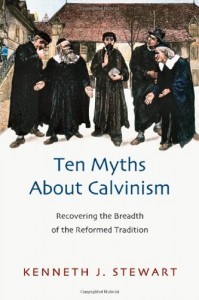 Kenneth J. Stewart. Ten Myths About Calvinism: Recovering the Breadth of the Reformed Tradition (IVP Academic, 2011).
Kenneth J. Stewart. Ten Myths About Calvinism: Recovering the Breadth of the Reformed Tradition (IVP Academic, 2011).
Meant to be a help to friends and foes of John Calvin.
[image error]Timothy Keller. King's Cross: The Story of the World in the Life of Jesus (Dutton, 2011).
I've heard great things, just haven't had time to dig in. Maybe I will once I finish my own series on Mark. Gregg R. Allison. Historical Theology: An Introduction to Christian Doctrine (Zondervan, 2011).
Gregg R. Allison. Historical Theology: An Introduction to Christian Doctrine (Zondervan, 2011).
Designed as companion to Grudem, this would be a good resource to have on your shelf.
May 6, 2011
"I Was Glad to Weep Before You"
 One of the most moving sections of Confessions is Book IX where Augustine recounts the life and death of his beloved mother Monica. By her son's account, Monica, though a devout Christian, did not have an easy life. She was, for a time, addicted to alcohol. Later she married a surly pagan man who did not share her Christian faith or character. Perhaps worst of all, her oldest child was wayward and far from the Lord.
One of the most moving sections of Confessions is Book IX where Augustine recounts the life and death of his beloved mother Monica. By her son's account, Monica, though a devout Christian, did not have an easy life. She was, for a time, addicted to alcohol. Later she married a surly pagan man who did not share her Christian faith or character. Perhaps worst of all, her oldest child was wayward and far from the Lord.
That wasn't the end of the story of course. Augustine was famously converted in Milan and went on to become the Church's most significant theologian. At her death, Monica explained that she was ready to leave this world because her hope in this world was already fulfilled. "The one reason I wanted to stay longer in this life," she said, "was my desire to see you a Catholic [as opposed to a heretical] Christian before I die. My God has granted this in a way more than I had hoped."
She died at age 56, when Augustine was 33.
In keeping with the ideals of the day, Augustine tried hard to fight back tears at the funeral. He didn't want to imply that his mother was to be pitied, for she had entered a glorious rest. But despite his "inward struggle" and "powerful act of mental control" Augustine eventually allowed himself to grieve.
From then on, little by little, I was brought back to my old feelings about your handmaid, recalling her devout attitude to you and her holy gentle and considerate treatment of us, of which I had suddenly been deprived. I was glad to weep before you about her an for her, about myself and for myself.
Now I let flow the tears which I had held back so that they ran as freely as they wished. My heart rested upon them, and it reclined upon them because it was your ears that were there, not those of some human critic who would put a proud interpretation on my weeping.
And now, Lord, I make my confession to you in writing. Let anyone who wishes read and interpret as he pleases. If he finds fault that I wept for my mother for a fraction of an hour, the mother who had died before my eyes had wept for me that I might live before your eyes, let him not mock me but rather, if a person of much charity, let him weep himself before you for my sins; for you are the Father of all the brothers of your Christ.
May God give special grace to all those who weep for deceased mothers. And let us offer special thanksgiving for all the mothers who have wept over us.
May 5, 2011
A Modest Proposal on Moms
Tis the season for special days honoring mothers and graduates. So I thought I'd use the occasion to suggest one modest proposal. It's aimed at Christian colleges. Here it is in a nutshell: admit you have mothers.
My wife and I both graduated from Christian colleges. I've seen more than a decades worth of alumni magazines and college promo materials. As a pastor, I see the magazines from other colleges too, as many of them are sent to the church. These magazines are usually well done. I'm sure many people work hard to make these materials attractive and informative, while also putting the schools best face forward.
All I'm suggesting is that some of the best faces to put forward are mothers. And yet I can't ever recall seeing a mom focused in alumni material from any Christian college. I know my recollection is hardly a scientific survey, so take this as one man's perception. But I just don't remember ever seeing anything about moms.
And before someone says, "Well, I've never seen a spotlight on auto mechanics or lumberjacks" let me point out that roughly half of the graduates of Christian colleges are mothers. Close to 60% of the graduates are woman and most them will get married and have children, many of them as their primary vocation for a long season of their lives. So I'm not munching on sour grapes that one particular kind of person never gets mentioned. I'm wondering why the calling lived out by more graduates than any other calling is so infrequently celebrated?
I understand that alumni magazines try to focus on the extraordinary. Inevitably they highlight graduates serving in unusual ways, or graduates with significant influence, or graduates who have gone on to make the school proud. I have absolutely no problem with any of that. Profile those folks most of the time. But for liberal arts schools in particular–the kind of institutions that pride themselves on making you a well-rounded person and a lifelong learner–it would be wonderful to see some spotlight on the "ordinary" graduates, especially if half of your graduates will go on to serve in the same field.
The last thing we want to convey is that moms haven't gone on to do anything significant. The second to the last thing we want to convey is that a mom doesn't really benefit from a good education and a Christian worldview.
So here's my challenge: let me know if you've seen an alumni magazine from a Christian college that spotlights mothers, not mothers who also dance in the ballet and spin centrifuges, but mothers who are "just" mothers.
And a bonus challenge, this one for our fine Christian colleges: we'd love to see how proud you are of the half of your graduates putting their education to good use by helping their husbands, raising kids, serving in the church, and doing a hundred other amazing things that don't look impressive to most people but should look impressive to us.



